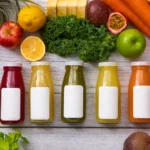When can babies have juice? It’s a question many parents ponder as they navigate their child’s nutrition journey. The problem lies in balancing the desire to introduce new foods with concerns about their impact on a baby’s health. The solution? Let’s explore the timing and considerations for introducing juice to your little one’s diet.
As a parent, it’s natural to want the best for your baby’s health, but the introduction of juice, such as passion fruit juice, can pose challenges. On one hand, juice may seem like a convenient way to provide hydration and essential nutrients. However, many store-bought juices are high in sugar and lack the fiber found in whole fruits, raising concerns about their impact on a baby’s developing palate and overall health.
To address this dilemma, it’s essential to approach the introduction of juice with caution and mindfulness. While small amounts of diluted, freshly squeezed juice, such as watermelon cucumber juice, may be introduced around 6-12 months of age, it’s crucial to prioritize breast milk or formula as the primary source of hydration and nutrition during the first year. By offering juice in moderation and opting for homemade or low-sugar varieties, parents can help their babies explore new flavors while supporting their overall health and development.
Understanding The Concerns: Sugar Content And Nutritional Impact
Understanding the concerns surrounding juice for babies involves recognizing both its high sugar content and limited nutritional benefits. While juice may seem like a convenient option, especially for hydration, its excessive sugar levels can contribute to tooth decay and potential weight issues. Additionally, compared to whole fruits, juice lacks essential fiber and nutrients, raising concerns about its overall impact on a baby’s diet and health.
Importance Of Breast Milk Or Formula In Early Months
Keeping in mind the sugar concentration and nutritional needs of infants, it’s crucial to emphasize the importance of breast milk or formula during the early months of a baby’s life. Breast milk and formula are specifically designed to provide infants with the perfect balance of nutrients essential for their growth and development. They contain the ideal blend of carbohydrates, proteins, and fats, along with essential vitamins and minerals, all tailored to meet a baby’s evolving nutritional requirements.
Moreover, breast milk offers additional benefits, such as immune support and bonding between the baby and caregiver. By prioritizing breast milk or formula as the primary source of nutrition, parents can ensure that their babies receive the best possible start in life, laying the foundation for optimal health and well-being.
Recommended Age Range For Introducing Juice
Alright, now, let’s talk about the juicy topic of introducing juice to our little ones! Typically, pediatricians suggest waiting until around 6 to 12 months before offering juice to babies. This timeframe allows their tiny tummies and developing systems to handle something besides breast milk or formula. But remember, every baby is different, so it’s always a good idea to chat with your pediatrician first to ensure it’s the right time for your little juice-lover-in-training. And when you do start, think small sips and big smiles, diluted with water to keep things gentle on their delicate systems.
Considerations For Homemade Versus Store-Bought Juice
When it comes to introducing juice to your little one, there are important considerations to weigh between homemade and store-bought options. Let’s delve into the factors influencing this decision:
Ingredients and Nutritional Content
- Homemade Juice: With homemade juice, you have full control over the ingredients, allowing you to use fresh fruits and vegetables without added sugars or preservatives, ensuring maximum nutritional value.
- Store-Bought Juice: Store-bought juices often contain added sugars, artificial flavors, and preservatives, which can detract from their nutritional benefits and pose potential health risks for babies.
Sugar Content and Dilution
- Homemade Juice: You can adjust the sweetness and concentration of homemade juice by diluting it with water, ensuring a lower sugar content that’s more suitable for babies.
- Store-Bought Juice: Store-bought juices tend to have higher sugar concentrations, requiring careful dilution to make them suitable for babies while still offering adequate hydration and flavor.
Freshness and Purity
- Homemade Juice: Making juice at home ensures freshness and purity, as you know exactly what ingredients are going into the mix and can avoid any potential contaminants.
- Store-Bought Juice: While some store-bought juices may claim to be “100% pure,” they may still undergo processing and pasteurization, which can affect their nutritional quality and freshness.
Cost and Convenience
- Homemade Juice: While making juice at home may require more time and effort, it can be a cost-effective option, especially when using seasonal or locally sourced fruits and vegetables.
- Store-Bought Juice: Store-bought juices offer convenience but may come with a higher price tag, particularly for premium or organic varieties.
Monitoring Baby’s Reaction And Tolerance To Juice
Now that you have an idea about the considerations for introducing juice to your baby, it’s important to monitor their reaction and tolerance closely. Start by offering small amounts of diluted juice and observe how your baby responds. Watch for any signs of discomfort, such as gas, bloating, or changes in bowel habits.
Additionally, pay attention to your baby’s overall demeanor and energy levels after consuming juice. If you notice any adverse reactions or concerns, consider adjusting the amount or frequency of juice offered, or consult with your pediatrician for guidance. By staying attentive and responsive to your baby’s cues, you can ensure a positive and healthy introduction to this new beverage option.
Alternative Hydration And Nutritional Options For Babies
Last but not least, let’s explore three alternative hydration and nutritional options for babies, ensuring they receive the essential fluids and nutrients they need for healthy growth and development.
Breast Milk or Formula
Breast milk or formula remains the primary source of hydration and nutrition for babies during the first year of life. Breast milk provides essential nutrients, antibodies, and hydration tailored to the baby’s needs, while formula offers a suitable alternative for infants who are not breastfed.
Water
Once babies start solid foods around 6 months of age, they may begin to drink small amounts of water to complement their diet and stay hydrated, especially in hot weather or during physical activity. However, it’s important not to offer water in large quantities, as it can fill up their tiny tummies and displace breast milk or formula, which are essential for their growth and development.
Homemade Fruit and Vegetable Purees
Instead of juice, consider offering homemade fruit and vegetable purees to provide hydration and essential nutrients to your baby. Purees made from fresh fruits and vegetables offer fiber, vitamins, and minerals in their natural form, promoting healthy digestion and development. Dilute purees with breast milk, formula, or water for added hydration while introducing a variety of flavors and textures to your baby’s diet.
Conclusion
In conclusion, determining when babies can have juice involves careful consideration of their developmental stage, nutritional needs, and potential risks. While juice can be introduced around 6 to 12 months of age in small amounts and diluted with water, it’s essential to prioritize breast milk or formula as the primary source of hydration and nutrition during the first year.
By consulting with pediatricians, monitoring babies’ reactions, and opting for homemade or low-sugar varieties, parents can navigate the introduction of juice with confidence, ensuring a positive and healthy start to their little ones’ dietary journey.
FAQs
What Juices Can A 6 Month Old Drink?
At 6 months, babies can start with small amounts of diluted, freshly squeezed fruit juices like apple or pear, but it’s crucial to consult a pediatrician first.
When Can I Give My Baby Diluted Juice?
Diluted juice can be introduced to babies around 6 to 12 months, but it’s essential to check with a pediatrician to ensure it’s appropriate for your baby’s individual needs and development.
Can I Give My 3 Month Old Apple Juice?
It’s not recommended to give apple juice or any other juice to a 3-month-old baby, as their digestive systems are not ready for anything besides breast milk or formula.
Why Can’t Babies Have Juice Before 1?
Babies shouldn’t have juice before 1 year due to the high sugar content, lack of nutritional benefits, and potential risks to their developing digestive systems and teeth.



![5 Best Ways for Juice Storage - [ Store Fruits & Vegetables Juice ] Juice Storage](https://juicerhunter.com/wp-content/uploads/2024/01/Juice-Storage-150x150.webp)


